Darwin Major Business Group Over the Horizon Opportunities report: Call to boost private investment
The $40bn economy is slipping out of reach as a new report identifies shortfalls in the Territory economy. Read the full analysis.
Northern Territory
Don't miss out on the headlines from Northern Territory. Followed categories will be added to My News.
Those involved in construction of Darwin’s waterfront precinct in the 2000s remember it as a benchmark for doing business in the Territory.
The story goes that the then new Chief Minister Clare Martin committed $100m to the project, which subsequently leveraged a billion dollars from private investors to develop the precinct.
At its core, Darwin Major Business Group’s Over the Horizon Opportunities report is about the importance of private investment to the Territory. It’s launch at Darwin waterfront on Thursday was as symbolic as it was practical.
The study benchmarks current economic activity with those forecast in the 2020 Territory Economic Reconstruction Commission report, including targeting a $40bn economy by 2030.
The report said at its present rate, the Territory economy will only reach $34bn by 2030.
Here are the report’s key findings:
Population:
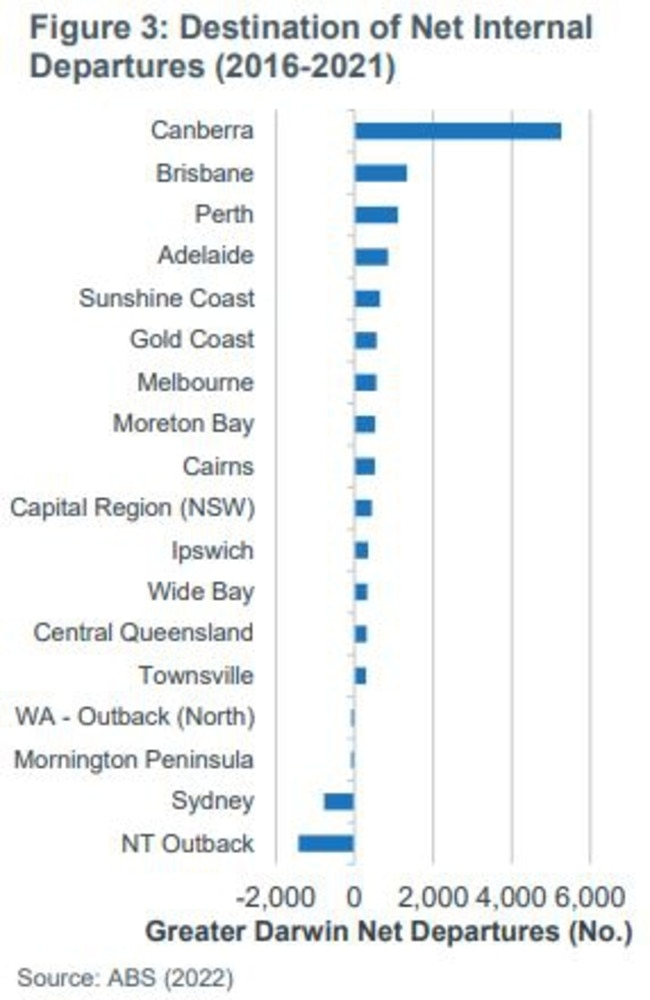
In the five years between 2017-22, the Territory’s natural population increase was been between 1-1.2 per cent – about twice the national average and immigration rates have fluctuated around Covid-19 more-or-less in line with natural increases, but net interstate migration continues, literally, to head south.
Between 2016-21 thousands left the Territory for interstate, with Canberra getting the lion’s share of Territorians with more than 5000 leaving here for Canberra.
Brisbane, Perth and Adelaide are the next preferred destinations.
ABS figures showed that in the year to September 2023, 3,606 more Territorians left than migrated here from interstate.
Aboriginal Territorians make up 55 per cent of the NT’s outback population and 11 per cent of Darwin’s.
Participation:
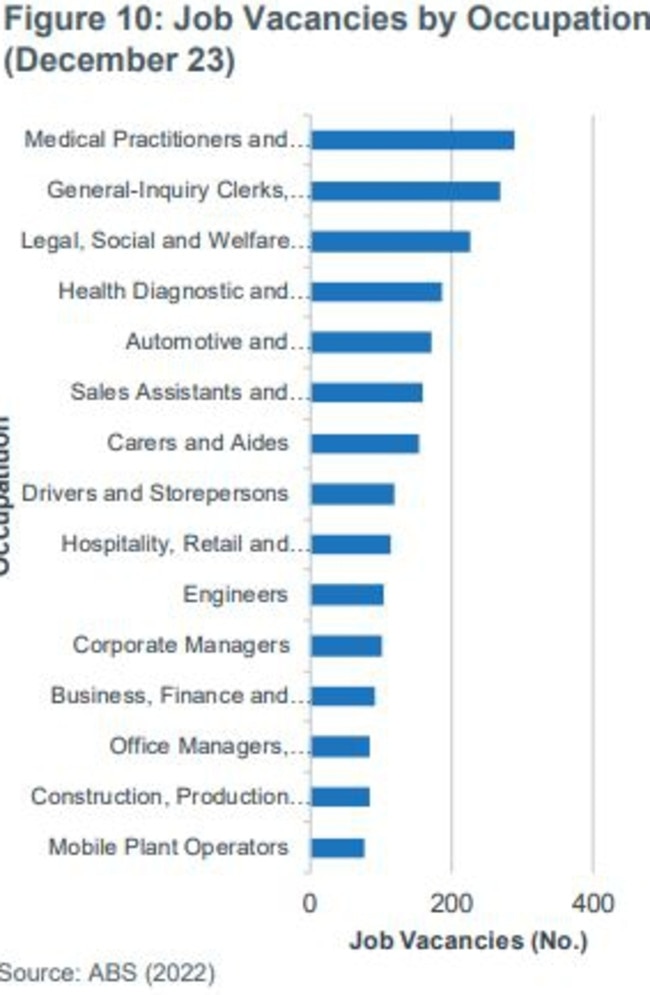
The report identified 76 per cent of Aboriginal Territorians are neither employed or in the labour force, almost 80 per cent didn’t complete secondary school, and that nearly all rural and remote communities are experiencing low levels of economic participation relative to greater Darwin, Alice Springs and Katherine.
Territory job vacancies have grown faster than Australia generally, and the vacancies are in higher skill, higher income positions, with acute shortages in medicine and law.
The non-residential workforce varies, moving from about 4200 in 2011 to almost 7000 five years later and sitting at about 6000 in 2021.
Most of our non-resident workers come from Cairns, Perth, Adelaide, Brisbane, Sunshine Coast and the Gold Coast – the main source of FIFO or DIDO workers.
The report confirms the NT’s shrinking defence population. Almost 20 per cent of the ACT’s workforce is defence related, compared with just 4.1 per in Darwin.
Defence workers as a percentage of population is second-highest in Darwin at 3.3 per cent compared with 4 per cent in the ACT.
Public Service:
The report flags the imbalance in the NT between public sector and private sector wages.
The proportion of employees in public administration fluctuated wildly in the Territory over two decades, passing 15 per cent in 2009 then declining steadily to about 9 per cent in 2019 before climbing back to past 11 per cent post-Covid.
Nationally its around 4 per cent.
The report identified mining as the NT’s best-paid sector with average annual salaries above $100,000.
Utilities including electricity, gas and water average around $100,000 annually with public administration third.
The report found the NT’s public administration sector is “large and growing”, which can occur at the expense of other sectors in the economy.
Major Projects:
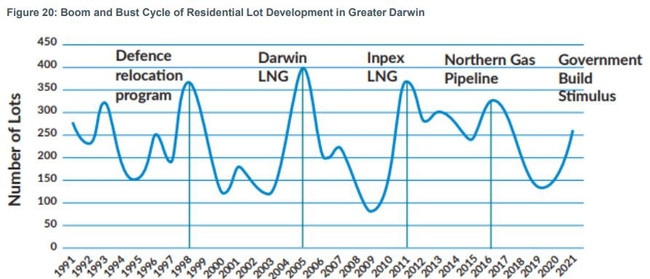
The Territory has billions in the major projects pipeline – as the government likes to tell us – but the challenge is getting those developments off the ground.
The $7bn Santos project was wantonly delayed in the courts; Beetaloo Basin was subject to a fracking moratorium and two inquiries while the worldwide value of LNG sank due to increased global supply; Middle Arm’s subject to a parliamentary inquiry with no certainty around any of the targeted projects.
Meanwhile, urban renewal developments like Larrakeyah Cultural Centre and the National Aboriginal Art Gallery labour under delays.
The vast majority of projects listed in the report are federal or NT government backed.
By far the largest project in the pipeline, the $35bn Sun Cable development, is struggling to persuade most people it’s going to happen.
Investment:
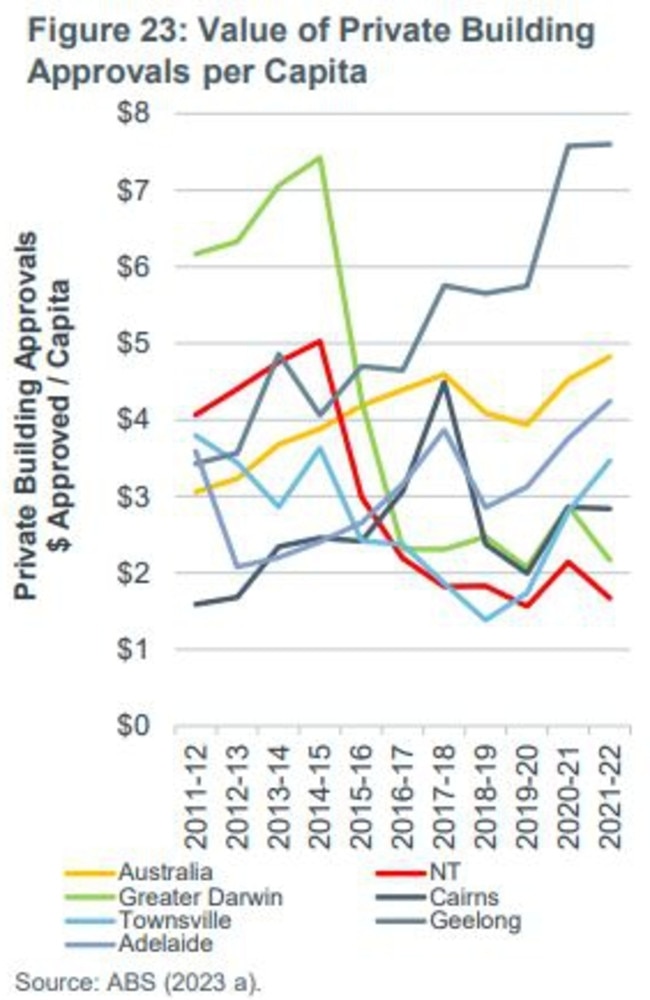
Supported by 2023 ABS data, the report makes a strong case about the decline in private investment.
“The level of private investment in Greater Darwin and the NT has reduced considerably over time, while growing in other regions and in Australia generally.”
Master Builders Association NT’s Ben Carter concluded the Territory is at the “crossroads”.
“The level of private housing construction and home ownership are key indicators of the health of the economy, and both are at historic lows in the Territory,” Mr Carter said.
“Private investment has fallen to a severely low level. Construction firms and other business sectors need investors to be confident about putting their money into the Territory economy and this is clearly not happening,”
In contrast, the value of public building approvals per capita in the Territory and Darwin are the country’s highest.
Costs of living and business:
The report found Darwin and the NT are exposed to higher costs than elsewhere in Australia – about 20 per cent more for business and 50 per cent more for home than the rest of the country.
Freight costs per payload tonne are $474 in Darwin, $366 in remote NT compared with $57 in Adelaide, Perth and Sydney.
Insurance premiums in northern Australia are substantially higher than in the rest of Australia.
Public infrastructure:
The report identified a shortfall in public infrastructure is holding the Territory back.
It identified that 68 per cent of NT roads are unsealed and that across the past decade, 73 per cent of road fatalities in the Territory have occurred on rural and remote roads.
“Lack of public investment into sealed road infrastructure in the NT increases operating costs and risk to businesses along with contributing to lower levels of liveability compared to the rest of Australia.”
Manufacturing:

The Territory has a whopping $1.8bn trade deficit in manufactured products, with the report identifying nearly all manufactured goods consumed in the NT are imported.
It found the only product with a net positive export value was metal goods.
Land Tenure and Housing:
Almost three decades after Native Title legislation was passed by the Keating government, a number of Territory claims remain unresolved.
It also identified the housing market in the Territory and Greater Darwin had less owner occupiers than nationally, and the proportion of dwellings that are owner occupied has decreased over time.
The report concluded rental vacancy rates were at 1.9 per cent in December.
“There is little spare capacity in the Darwin residential market to support future growth without additional development.
Crime:
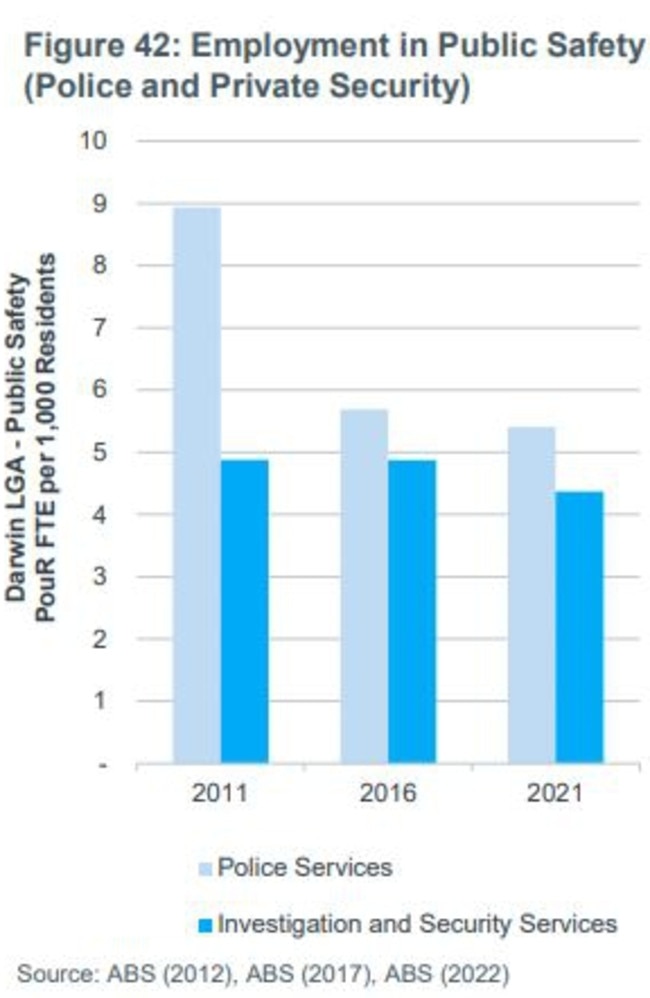
The Territory’s rates of crime against the person and against property dwarf compatible interstate centres including Cairns and Townsville.
The report showed a sharp decline in the number of police on the beat in Darwin in 2021 compared to a decade earlier. It finds the two crime types are higher in Darwin than they were in Palmerston.
“The number of police per capita in Darwin LGA has reduced over time, while private security has remained steady to down,” the report said. “Increased police and security presence can deter crime, increasing liveability.”
Tourism:
“The NT economy is three-times more reliant on aviation as a means of travel than Australia generally,” the report concluded. “Airline seat capacity to/from Darwin is recovering at a slower rate than other markets or Australia generally.”
The economic impact of tourism on the economy has declined from 4.2 per cent to 2.3 per cent in the five years to 2022.
Territorians are three times more reliant on aviation as a means of travel than the rest of the country.
More Coverage
Originally published as Darwin Major Business Group Over the Horizon Opportunities report: Call to boost private investment





